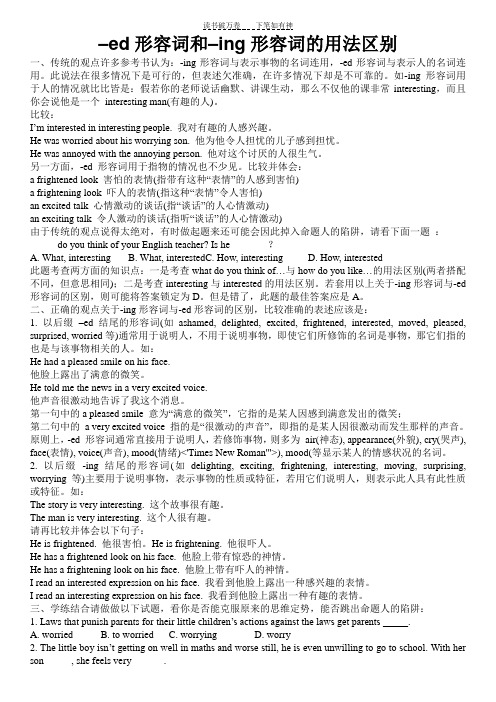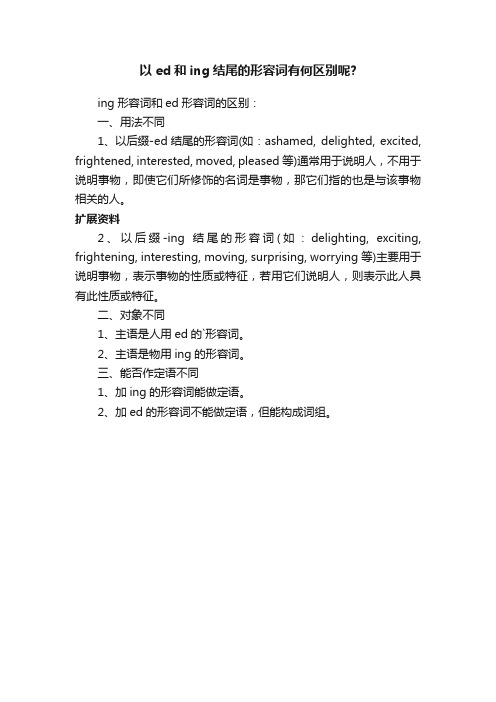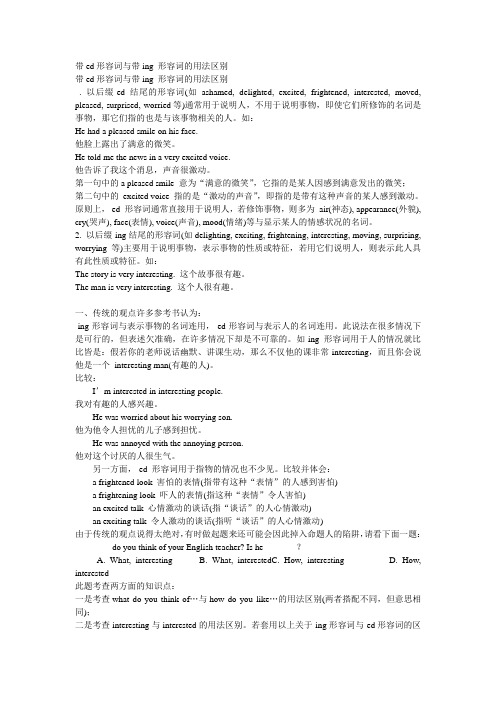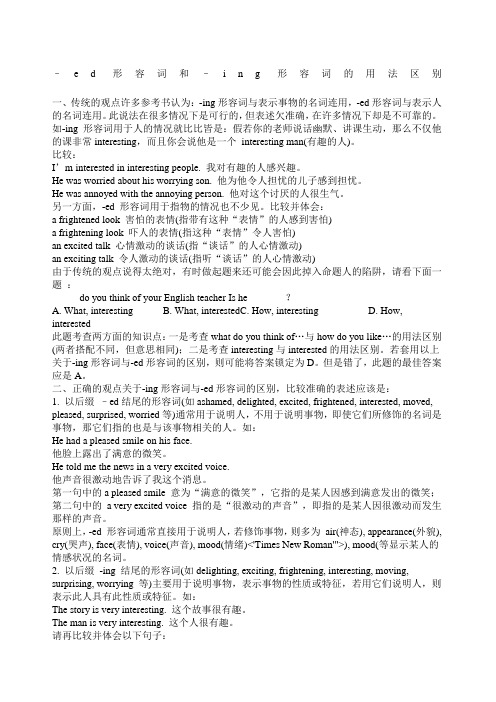ed和ing结尾的形容词的区别
以ing和ed结尾的形容词用法

以ing和ed结尾的形容词用法英语中,以-ing和-ed结尾的形容词称为分词形容词(participial adjectives),它们常常用于描述人或物的特征或状态。
下面将介绍这两种形容词的用法和区别。
1. 以-ing结尾的形容词以-ing结尾的形容词表示被动、描述状态或特征,常用来形容事物的性质或特点。
它们可以修饰人、物、地点等。
例如:- The stunning sunset painted the sky with vibrant colors.(令人惊叹的日落用绚丽的颜色给天空涂抹上了色彩。
)- I found the book boring and couldn't finish reading it.(我觉得这本书无聊,无法读完。
)- She is a caring teacher who always listens to her students' problems.(她是一位关心学生的老师,总是倾听学生的问题。
)2. 以-ed结尾的形容词以-ed结尾的形容词表示感受、描述人或物的状态,常用来形容人的感受或状态。
例如:- I'm really excited about the upcoming vacation.(我对即将到来的假期感到非常兴奋。
)- He was surprised to see his old friend at the party.(他在聚会上见到老朋友感到很惊讶。
)- The frightened child ran into her mother's arms for comfort.(受到惊吓的孩子跑到妈妈的怀里寻求安慰。
)需要注意的是,有些形容词既可以以-ing也可以以-ed结尾,但含义可能不同。
例如:interested(对某事感兴趣)和 interesting(有趣的)。
在使用时,我们需要根据上下文来确定正确的形容词。
ed形容词和ing形容词

–ed形容词和–ing形容词的用法区别一、传统的观点许多参考书认为:-ing形容词与表示事物的名词连用,-ed形容词与表示人的名词连用。
此说法在很多情况下是可行的,但表述欠准确,在许多情况下却是不可靠的。
如-ing 形容词用于人的情况就比比皆是:假若你的老师说话幽默、讲课生动,那么不仅他的课非常interesting,而且你会说他是一个interesting man(有趣的人)。
比较:I’m interested in interesting people. 我对有趣的人感兴趣。
He was worried about his worrying son. 他为他令人担忧的儿子感到担忧。
He was annoyed with the annoying person. 他对这个讨厌的人很生气。
另一方面,-ed 形容词用于指物的情况也不少见。
比较并体会:a frightened look 害怕的表情(指带有这种“表情”的人感到害怕)a frightening look 吓人的表情(指这种“表情”令人害怕)an excited talk 心情激动的谈话(指“谈话”的人心情激动)an exciting talk 令人激动的谈话(指听“谈话”的人心情激动)由于传统的观点说得太绝对,有时做起题来还可能会因此掉入命题人的陷阱,请看下面一题:_____ do you think of your English teacher? Is he _______?A. What, interestingB. What, interestedC. How, interestingD. How, interested此题考查两方面的知识点:一是考查what do you think of…与how do you like…的用法区别(两者搭配不同,但意思相同);二是考查interesting与interested的用法区别。
以ed和ing结尾的形容词有何区别呢?

以ed和ing结尾的形容词有何区别呢?
ing形容词和ed形容词的区别:
一、用法不同
1、以后缀-ed结尾的形容词(如:ashamed, delighted, excited, frightened, interested, moved, pleased等)通常用于说明人,不用于说明事物,即使它们所修饰的名词是事物,那它们指的也是与该事物相关的人。
扩展资料
2、以后缀-ing结尾的形容词(如:delighting, exciting, frightening, interesting, moving, surprising, worrying等)主要用于说明事物,表示事物的性质或特征,若用它们说明人,则表示此人具有此性质或特征。
二、对象不同
1、主语是人用ed的`形容词。
2、主语是物用ing的形容词。
三、能否作定语不同
1、加ing的形容词能做定语。
2、加ed的形容词不能做定语,但能构成词组。
形容词ed和ing用法

形容词ed和ing用法一、形容词 -ed和 -ing的词性解释1. -ed形容词- 词性:形容词。
它是由动词的过去分词形式转化而来的。
- 意思:通常用来描述人的感受、情绪或状态。
- 用法:一般作表语,用来修饰人或有类似人的情感的主语。
- 近义词:无特定的固定近义词形式,但可根据具体的 -ed形容词含义找到表达相似情感的其他形容词。
例如,“surprised”(感到惊讶的)近义词可以是“astonished”。
- 双语例句:- I was really excited when I heard the good news. (当我听到这个好消息时,我真的很兴奋。
)- She looked disappointed when she didn't get the job. (当她没有得到那份工作时,她看起来很失望。
)- He seemed tired after a long day at work. (在工作了漫长的一天后,他看起来很疲惫。
)- They were bored with the long speech. (他们对冗长的演讲感到厌烦。
)- My friend was frightened by the sudden noise. (我的朋友被突然的噪音吓了一跳。
)- You look confused. Do you need some help? (你看起来很困惑。
你需要一些帮助吗?)- We were satisfied with the service in the restaurant. (我们对餐厅的服务很满意。
)- She was amazed at his magic tricks. (她对他的魔术感到惊奇。
)- The little girl was embarrassed when she made a mistake in public. (这个小女孩在公众场合犯错时感到很尴尬。
–ed形容词和–ing形容词的用法区别

–ed形容词和–ing形容词的用法区别一、传统的观点许多参考书认为:-ing形容词与表示事物的名词连用,-ed形容词与表示人的名词连用。
此说法在很多情况下是可行的,但表述欠准确,在许多情况下却是不可靠的。
如-ing 形容词用于人的情况就比比皆是:假若你的老师说话幽默、讲课生动,那么不仅他的课非常interesting,而且你会说他是一个interesting man(有趣的人)。
比较:I’m interested in interesting people. 我对有趣的人感兴趣。
He was worried about his worrying son. 他为他令人担忧的儿子感到担忧。
He was annoyed with the annoying person. 他对这个讨厌的人很生气。
另一方面,-ed 形容词用于指物的情况也不少见。
比较并体会:a frightened look 害怕的表情(指带有这种“表情”的人感到害怕)a frightening look 吓人的表情(指这种“表情”令人害怕)an excited talk 心情激动的谈话(指“谈话”的人心情激动)an exciting talk 令人激动的谈话(指听“谈话”的人心情激动)由于传统的观点说得太绝对,有时做起题来还可能会因此掉入命题人的陷阱,请看下面一题:_____ do you think of your English teacher? Is he _______?A. What, interestingB. What, interestedC. How, interestingD. How, interested此题考查两方面的知识点:一是考查what do you think of…与how do you like…的用法区别(两者搭配不同,但意思相同);二是考查interesting与interested的用法区别。
ing和ed结尾的形容词大全及辨析

以ing 和ed 结尾的形容词的区别By Uganenglish1. 以ing结尾的动词变化而来的形容词一般修饰物,译为“令人…的”,常作定语;excitingnews,主要用于说明事物,表示事物的性质或特征,若用它们说明人,则表示此人具有此性质或特征。
2. 以-ed结尾的动词变化而来的形容词一般修饰人,译为“(人)…的”,常作表语;I amexcited. 通常用于说明人,不用于说明事物,即使它们所修饰的名词是事物,那它们指的也是与该事物相关的人。
十五组形容词:encouraging 令人鼓舞的 encouraged 受到鼓舞的interesting 有趣的 interested 感兴趣的astonishing令人惊呆的astonished 惊呆的surprising 令人惊奇的 surprised感到好奇的moving 令人感动的moved 感动的frightening令人害怕的frightened害怕的terrifying令人恐惧terrified感到恐惧的puzzling 令人困惑不解的 puzzled感到困惑的satisfying令人满意的 satisfied感到满意的tiring 令人厌倦的 tired感到厌烦的amazing令人惊讶的 amazed感到惊讶的boring 令人讨厌的 bored感到厌烦的exciting令人兴奋的 excited感到激动的touching 触动人心的 touched感动的embarrassing令人尴尬的 embarrassed尴尬的1. He had a pleased smile on his face. 他脸上露出了满意的微笑。
2. He told me the news in a very excited voice. 他告诉了我这个消息,声音很激动。
3. The story is very interesting. 这个故事很有趣。
4. The man is very interesting. 这个人很有趣。
带ed形容词

带ed形容词与带ing 形容词的用法区别带ed形容词与带ing 形容词的用法区别. 以后缀-ed结尾的形容词(如ashamed, delighted, excited, frightened, interested, moved, pleased, surprised, worried等)通常用于说明人,不用于说明事物,即使它们所修饰的名词是事物,那它们指的也是与该事物相关的人。
如:He had a pleased smile on his face.他脸上露出了满意的微笑。
He told me the news in a very excited voice.他告诉了我这个消息,声音很激动。
第一句中的a pleased smile 意为“满意的微笑”,它指的是某人因感到满意发出的微笑;第二句中的excited voice 指的是“激动的声音”,即指的是带有这种声音的某人感到激动。
原则上,-ed 形容词通常直接用于说明人,若修饰事物,则多为air(神态), appearance(外貌), cry(哭声), face(表情), voice(声音), mood(情绪)等与显示某人的情感状况的名词。
2. 以后缀-ing结尾的形容词(如delighting, exciting, frightening, interesting, moving, surprising, worrying 等)主要用于说明事物,表示事物的性质或特征,若用它们说明人,则表示此人具有此性质或特征。
如:The story is very interesting. 这个故事很有趣。
The man is very interesting. 这个人很有趣。
一、传统的观点许多参考书认为:-ing形容词与表示事物的名词连用,-ed形容词与表示人的名词连用。
此说法在很多情况下是可行的,但表述欠准确,在许多情况下却是不可靠的。
如-ing 形容词用于人的情况就比比皆是:假若你的老师说话幽默、讲课生动,那么不仅他的课非常interesting,而且你会说他是一个interesting man(有趣的人)。
–ed形容词和–ing形容词的用法区别

–e d形容词和–i n g形容词的用法区别一、传统的观点许多参考书认为:-ing形容词与表示事物的名词连用,-ed形容词与表示人的名词连用。
此说法在很多情况下是可行的,但表述欠准确,在许多情况下却是不可靠的。
如-ing 形容词用于人的情况就比比皆是:假若你的老师说话幽默、讲课生动,那么不仅他的课非常interesting,而且你会说他是一个interesting man(有趣的人)。
比较:I’m interested in interesting people. 我对有趣的人感兴趣。
He was worried about his worrying son. 他为他令人担忧的儿子感到担忧。
He was annoyed with the annoying person. 他对这个讨厌的人很生气。
另一方面,-ed 形容词用于指物的情况也不少见。
比较并体会:a frightened look 害怕的表情(指带有这种“表情”的人感到害怕)a frightening look 吓人的表情(指这种“表情”令人害怕)an excited talk 心情激动的谈话(指“谈话”的人心情激动)an exciting talk 令人激动的谈话(指听“谈话”的人心情激动)由于传统的观点说得太绝对,有时做起题来还可能会因此掉入命题人的陷阱,请看下面一题:_____ do you think of your English teacher Is he _______?A. What, interestingB. What, interestedC. How, interestingD. How, interested此题考查两方面的知识点:一是考查what do you think of…与how do you like…的用法区别(两者搭配不同,但意思相同);二是考查interesting与interested的用法区别。
- 1、下载文档前请自行甄别文档内容的完整性,平台不提供额外的编辑、内容补充、找答案等附加服务。
- 2、"仅部分预览"的文档,不可在线预览部分如存在完整性等问题,可反馈申请退款(可完整预览的文档不适用该条件!)。
- 3、如文档侵犯您的权益,请联系客服反馈,我们会尽快为您处理(人工客服工作时间:9:00-18:30)。
-ed and –ing adjectives
Adjectives that end ‘-ed’ (e.g. ‘bored’, ‘interested’) and adjectives that end ‘-ing’ (e.g. ‘boring’, ‘interesting’) are often confused.
-ed adjectives
Adjectives that end ‘-ed’ describe emotions – they tell us how people feel about something.
∙I was very bored in the maths lesson. I almost fell asleep.
∙He was surprised to see Helen. She’d told him she was going to Australia.
∙Feeling tired and depressed, he went to bed.
-ing adjectives
Adjectives that end ‘-ing’ describe the thin g that causes the emotion – a boring lesson makes you feel bored.
∙Have you seen that film? It’s absolutely terrifying.
∙I could listen to him for hours. He’s one of the most interesting people I’ve ever met.
∙I can’t eat this! It’s disgusting! What is it?
Remember that people can be boring but only if they make other people
feel bored.
∙He talks about the weather for hours. He’s so boring.
∙NOT I was very boring at the party so I went home.
Here are some more adjectives that can have both an ‘-ed’ and an ‘-ing’ form
∙amused
∙amusing
∙annoyed
∙annoying
∙confused
∙confusing
∙disappointed
∙disappointing
∙excited
∙exciting
∙exhausted
∙exhausting
∙frightened
∙frightening
∙satisfied
∙satisfying
∙shocked
shocking。
